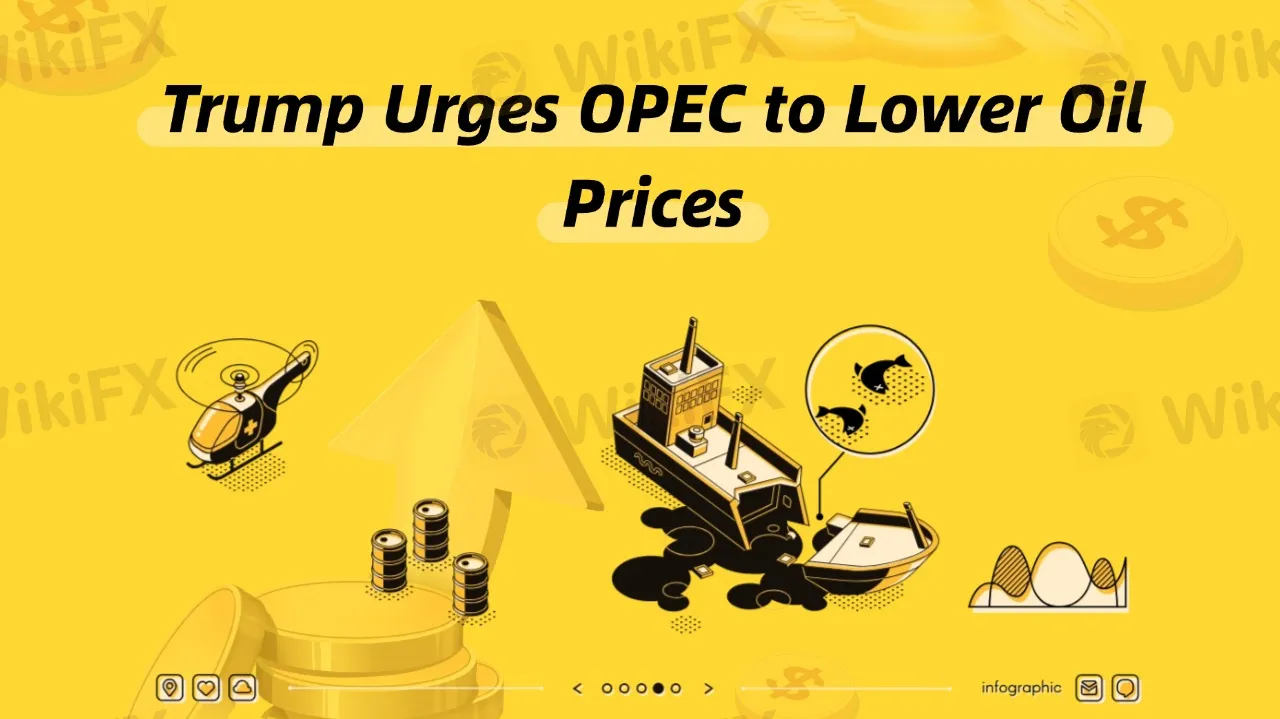简体中文
繁體中文
English
Pусский
日本語
ภาษาไทย
Tiếng Việt
Bahasa Indonesia
Español
हिन्दी
Filippiiniläinen
Français
Deutsch
Português
Türkçe
한국어
العربية
Trump Urges OPEC to Lower Oil Prices
Abstract:As of January 17, the EIA's oil status report showed that crude oil inventories have decreased for the ninth consecutive week, while Trump has urged OPEC to reduce oil costs.

Against the backdrop of fluctuating global oil prices, Trump recently issued a strong call to the Organization of Petroleum Exporting Countries (OPEC) to “lower oil costs.” He stated plans to intervene in the global oil market on a large scale and specifically urged OPEC member countries, including Saudi Arabia, to take measures to reduce oil prices. Trump believes that lowering oil prices will put pressure on Russia, which could lead to the end of the Ukraine conflict. At the same time, he argued that falling oil prices would help alleviate global inflation pressures and create conditions for lowering interest rates. Trump explicitly stated, “As oil prices fall, I will demand an immediate reduction in interest rates, and global interest rates should also decrease.”
Trump's remarks not only exert pressure on OPEC countries but also directly challenge the Federal Reserve's interest rate decisions. He publicly stated that he understands interest rates better than Federal Reserve Chairman Jerome Powell and predicted he would have a conversation with Powell at an appropriate time.
His comments had an immediate impact on the international oil market, with US WTI crude prices briefly dropping by 1.4% and Brent crude declining by 1.2%.
How will OPEC respond?
In response to Trump's call, OPEC's reaction may not be straightforward. As a key global oil-producing group, OPEC members have significant influence over oil price setting and production regulation. However, Trump's intervention may put these countries in a position where they need to weigh complex political and economic factors. Whether OPEC countries will respond to Trump's request largely depends on the global oil market's supply and demand situation and each country's economic interests. If OPEC decides to increase production further, it may lower oil prices in the short term, but it could also impact the fiscal revenues of its member countries, particularly those heavily reliant on oil exports.
Furthermore, OPEC is not fully unified, as some members may prefer to maintain higher oil prices, while others may support increasing production to meet global demand. While Trump's call is clear, OPEC's decision-making process will likely continue to be influenced by complex geopolitical and economic factors. Therefore, whether Trump's request can directly alter OPEC's production decisions remains to be seen.
For investors, keeping a close eye on OPEC and the Trump administration's developments will be crucial in understanding the future direction of oil prices.

Disclaimer:
The views in this article only represent the author's personal views, and do not constitute investment advice on this platform. This platform does not guarantee the accuracy, completeness and timeliness of the information in the article, and will not be liable for any loss caused by the use of or reliance on the information in the article.
Read more

Gold Prices Pull Back, Near Four-Week Low Amid Easing Risk Sentiment
As risk aversion fades and investors turn their attention to U.S. inflation data, gold prices retreat sharply, falling to their lowest levels in nearly a month.

Using Any of These Illegal Forex Trading Apps? Stop Before It Turns into a Crisis
The Reserve Bank of India (RBI) has listed out some illegal forex apps India. Read this article to know some of those apps.

IC Markets Sponsors AEL Limassol, Football Club Until 2027
AEL Limassol has renewed its deal with IC Markets (EU) Ltd, who will stay as the team’s Gold Sponsor until 2027. The sponsorship deal was first announced for the 2025–2026 season, but it has now been officially extended until 2027.

5 Reasons to Stay Away from Core Prime Markets
The Forex market is a very unpredictable, complex, and risky place. There are many brokers that appear genuine but can steal your hard-earned money. So, staying alert is the only way to survive in this dynamic environment. Therefore, in this article, we are sharing 5 warning signs about Core Prime Markets.
WikiFX Broker
Latest News
Asian chip stocks rise after Nvidia reclaims title of the world's most valuable company
Nvidia's comeback sparks a rally in Asian chip stocks
CNBC Daily Open: Despite all the uncertainty, the S&P 500 is flirting with record highs — strange times
PU Prime and AFA Announce Partnership at Madrid Event
eToro UK Launches 4% Stock Cashback Card: Earn Up to £1,500 Monthly
EBC Expands ETF CFD Offering & Copy Trading Education Partnership
Gold Prices Continue to Fall as Israel, Iran Agree on Ceasefire
China steps up push to internationalise the yuan as global dollar dominance wavers
Multibank Group Offices: Global Presence and Contact Info
ESMA Proposes Reporting Reforms That Could Cut Costs for Forex Brokers
Currency Calculator


